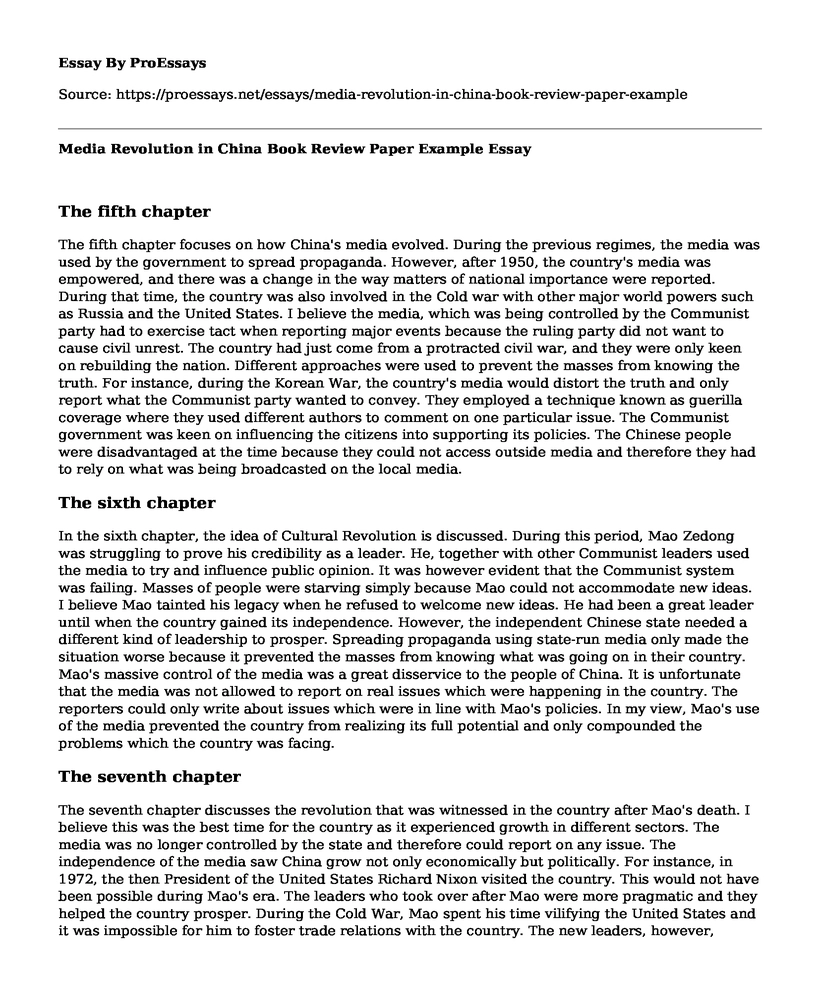The fifth chapter
The fifth chapter focuses on how China's media evolved. During the previous regimes, the media was used by the government to spread propaganda. However, after 1950, the country's media was empowered, and there was a change in the way matters of national importance were reported. During that time, the country was also involved in the Cold war with other major world powers such as Russia and the United States. I believe the media, which was being controlled by the Communist party had to exercise tact when reporting major events because the ruling party did not want to cause civil unrest. The country had just come from a protracted civil war, and they were only keen on rebuilding the nation. Different approaches were used to prevent the masses from knowing the truth. For instance, during the Korean War, the country's media would distort the truth and only report what the Communist party wanted to convey. They employed a technique known as guerilla coverage where they used different authors to comment on one particular issue. The Communist government was keen on influencing the citizens into supporting its policies. The Chinese people were disadvantaged at the time because they could not access outside media and therefore they had to rely on what was being broadcasted on the local media.
The sixth chapter
In the sixth chapter, the idea of Cultural Revolution is discussed. During this period, Mao Zedong was struggling to prove his credibility as a leader. He, together with other Communist leaders used the media to try and influence public opinion. It was however evident that the Communist system was failing. Masses of people were starving simply because Mao could not accommodate new ideas. I believe Mao tainted his legacy when he refused to welcome new ideas. He had been a great leader until when the country gained its independence. However, the independent Chinese state needed a different kind of leadership to prosper. Spreading propaganda using state-run media only made the situation worse because it prevented the masses from knowing what was going on in their country. Mao's massive control of the media was a great disservice to the people of China. It is unfortunate that the media was not allowed to report on real issues which were happening in the country. The reporters could only write about issues which were in line with Mao's policies. In my view, Mao's use of the media prevented the country from realizing its full potential and only compounded the problems which the country was facing.
The seventh chapter
The seventh chapter discusses the revolution that was witnessed in the country after Mao's death. I believe this was the best time for the country as it experienced growth in different sectors. The media was no longer controlled by the state and therefore could report on any issue. The independence of the media saw China grow not only economically but politically. For instance, in 1972, the then President of the United States Richard Nixon visited the country. This would not have been possible during Mao's era. The leaders who took over after Mao were more pragmatic and they helped the country prosper. During the Cold War, Mao spent his time vilifying the United States and it was impossible for him to foster trade relations with the country. The new leaders, however, understood that fostering trade relations with the United States would help steer the country forward.
Cite this page
Media Revolution in China Book Review Paper Example. (2022, Jun 20). Retrieved from https://proessays.net/essays/media-revolution-in-china-book-review-paper-example
If you are the original author of this essay and no longer wish to have it published on the ProEssays website, please click below to request its removal:
- Comparing and Contrasting the Achievements of Richard Milhous Nixon and Barack Obama
- Social Media Use in Business Communication - Essay Sample
- Essay Example on 12 Years a Slave and Black Cinema History
- The Killing of Princess Diana Essay Example
- Essay Example: 'A Talk to Teachers' by James Baldwin
- Modern Prefab Homes: Prioritizing User Needs in Denmark - Essay Sample
- Essay Sample on Hiram Park Bell: An Iconic American Life







